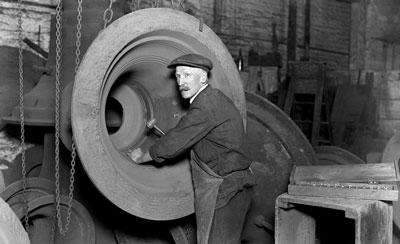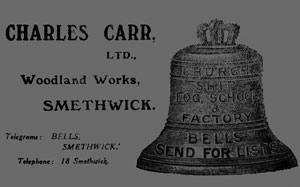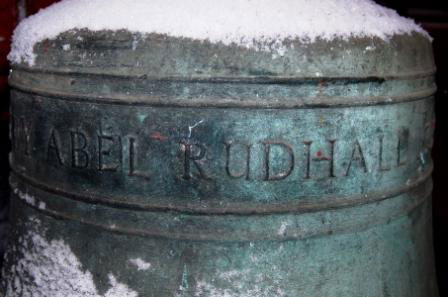Broadwas: St. Mary Magdalene Church; bells.
Rings: 5 [full circle ring], tenor 4-0-20 in (468 lb or 212 kg) in C♯ (1109.5 Hz)
The tower and bellcote at Broadwas Church are wood-framed and weather-boarded; and contain five bells, two of which are by Rudhalls of Gloucester, and two by Carr of Smethick. The fifth is of the fourteenth Century, and was cast at Gloucester, by an unknown bell-founder.
A restoration in Victorian times disclosed mediaeval paintings on the north wall of the church.
*The Rudhall family's bell foundry in Gloucester was established in the later 17th century by Abraham Rudhall. His first known bells were a ring of five supplied to St. Nicholas's church in Oddington in 1684 and one of them still remains in the church's tower and is rung regularly. Abraham rapidly gained credence as a founder and some twenty years later, in an advertisement which appeared in The London Postman in 1705, he announced that since the first year of the reign of James II he had cast 1 ring of ten bells, 10 of eight, 32 of six, and 25 of five, which together with bells for other peals numbered 547 besides others which he could not remember. He had cast bells for 7 cities, 36 market towns, 4 colleges and 162 parishes in thirteen counties, not to mention bells for gentlemen's seats, chapels and shops. At the time of his death he was referred to as 'The Prince of English Bellfounders'.
The bell foundry was carried on by *John Rudhall, who survived bankruptcy c. 1814 and died in 1835; his business was continued by Thomas Mears & Co. of the Whitechapel foundry.
Markings showing the name of Abel Rudhall, on a church bell.
*Charles Carr made church bells and gun barrels, including its largest bell for the Roman Catholic cathedral in Demerara in the West Indies; and bronze guns for the King of Siam.
*Charles Carr, Birmingham based manufacturer of church bells and general bell fittings. The firm was established in 1852 are known to have cast bells from 1885 until around 1923. Charles Carr opened a bell-foundry in Smethwick in 1891, which cast bells for many churches.
Below: From Birmingham Founders Database - of 456 Bells of *Charles Carr.
Date Church Dedication Number in Ring Area Notes 1896 Broadwas St. Mary Magdalene 2/5 Worcestershire Recast by Whitechapel 1977 1896 Broadwas St. Mary Magdalene 4/5 Worcestershire Retuned 1977
©peh



